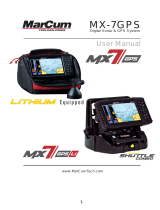
T Y
Thank you for choosing Humminbird®, the #1 name in marine electronics. Humminbird has built its reputation by designing and
manufacturing top quality, thoroughly reliable marine equipment. Your Humminbird is designed for trouble-free use in even the
harshest marine environment. We encourage you to read this manual carefully in order to get the full benefit from all the features
and applications of your Humminbird product.
Contact Humminbird Technical Support at humminbird.com or call 1-800-633-1468.
WARNING! This device should not be used as a navigational aid
to prevent collision, grounding, boat damage, or personal injury.
When the boat is moving, water depth may change too quickly
to allow time for you to react. Always operate the boat at very
slow speeds if you suspect shallow water or submerged objects.
WARNING! The electronic chart in your Humminbird unit is an
aid to navigation designed to facilitate the use of authorized
government charts, not to replace them. Only official
government charts and notices to mariners contain all of the
current information needed for the safety of navigation, and the
captain is responsible for their prudent use.
WARNING! Humminbird is not responsible for the loss of
data files (waypoints, routes, tracks, groups, recordings,
etc.) that may occur due to direct or indirect damage to the
unit’s hardware or software. It is important to back up your
control head’s data files periodically. Data files should also
be saved to your computer before restoring the control head
defaults or updating the software. See the following sections
of your Humminbird manual: Manage Screen Snapshots and
Recordings and Manage your Navigation Data: Import/Export
Navigation Data.
WARNING! Disassembly and repair of this electronic unit
should only be performed by authorized service personnel. Any
modification of the serial number or attempt to repair the original
equipment or accessories by unauthorized individuals will void the
warranty.
WARNING! Do NOT leave the control head microSD or SD card
slot cover open. The slot cover should always be closed to
prevent water damage to the unit.
WARNING! Do not travel at high speed with the unit cover
installed on the control head. Remove the unit cover before
traveling at speeds above 20 mph.
WARNING! The user shall maintain 20 cm separation from the
RF device to ensure compliance with RF exposure.
NOTE: Some features discussed in this manual require a
separate purchase, and some features are only available on
international models. Every effort has been made to clearly
identify those features. Please read the manual carefully in
order to understand the full capabilities of your model.
NOTE: The illustrations in this manual may not look the same as
your product, but your unit will function in a similar way.
NOTE: To purchase accessories for your control head, visit our
Web site at humminbird.com or contact Humminbird Technical
Support at 1-800-633-1468.
NOTE: The procedures and features described in this manual
are subject to change without notice. This manual was written
in English and may have been translated to another language.
Humminbird is not responsible for incorrect translations or
discrepancies between documents.
NOTE: Product specifications and features are subject to change
without notice.
NOTE: Humminbird verifies maximum stated depth in saltwater
conditions, however actual depth performance may vary due
to transducer installation, water type, thermal layers, bottom
composition, and slope.
ROHS STATEMENT: Product designed and intended as a fixed
installation or part of a system in a vessel may be considered beyond
the scope of Directive 2002/95/EC of the European Parliament and of
the Council of 27 January 2003 on the restriction of the use of certain
hazardous substances in electrical and electronic equipment.
ATTENTION INTERNATIONAL CUSTOMERS: Products sold in the U.S.
are not intended for use in the international market. Humminbird
international units provide international features and are designed
to meet country and regional regulations. Languages, maps, time
zones, units of measurement, and warranty are examples of
features that are customized for Humminbird international units
purchased through our authorized international distributors.
To obtain a list of authorized international distributors, please visit
our Web site at humminbird.com or contact Humminbird Technical
Support at (334) 687-6613.
2





















